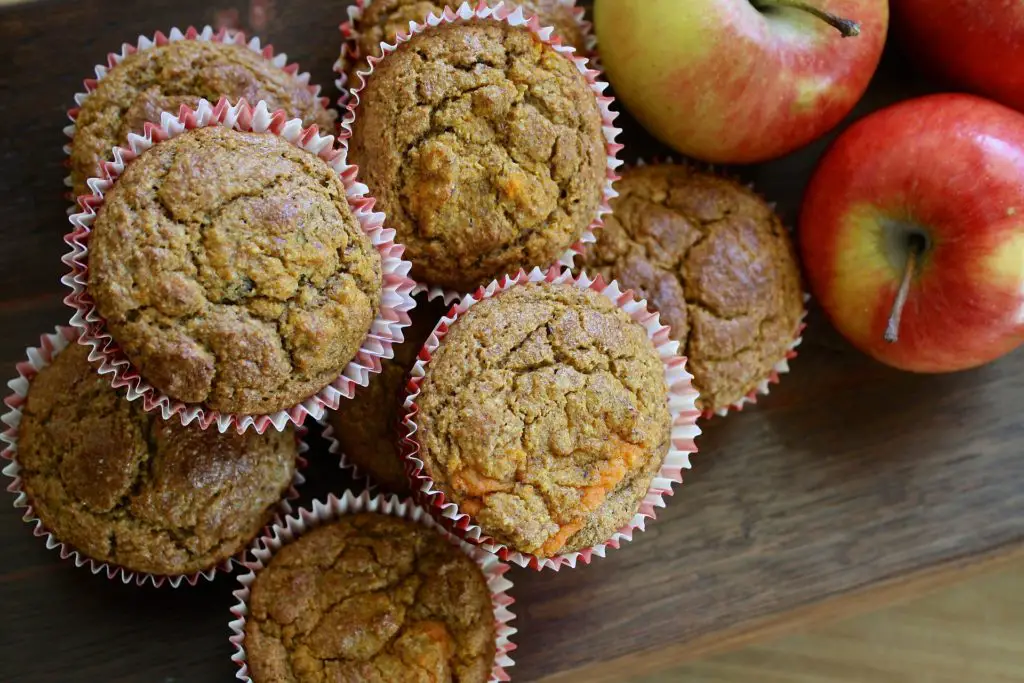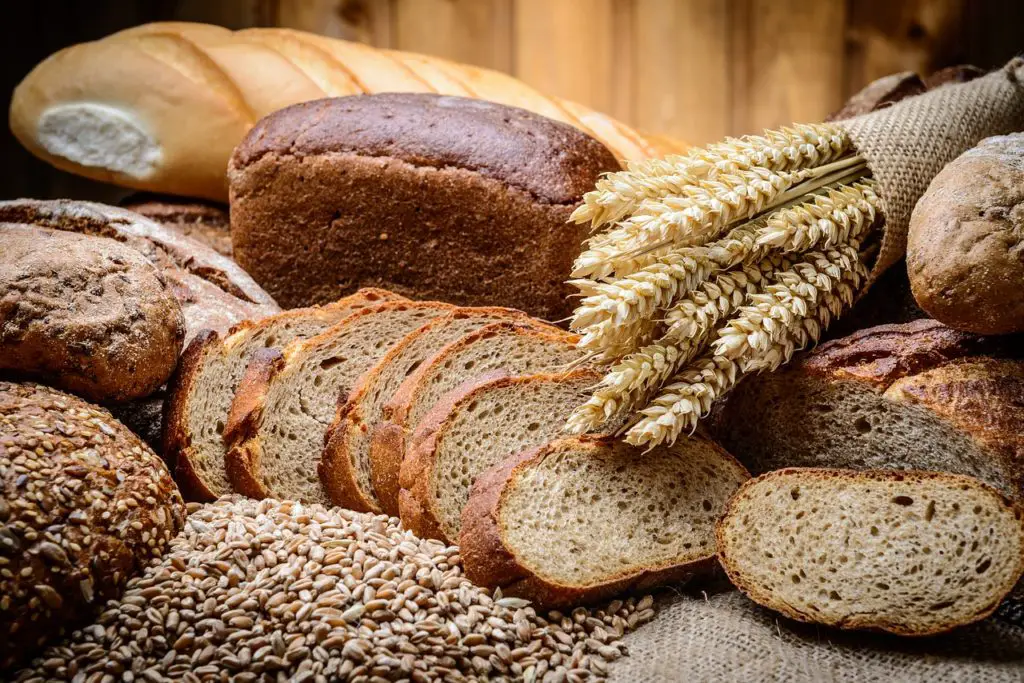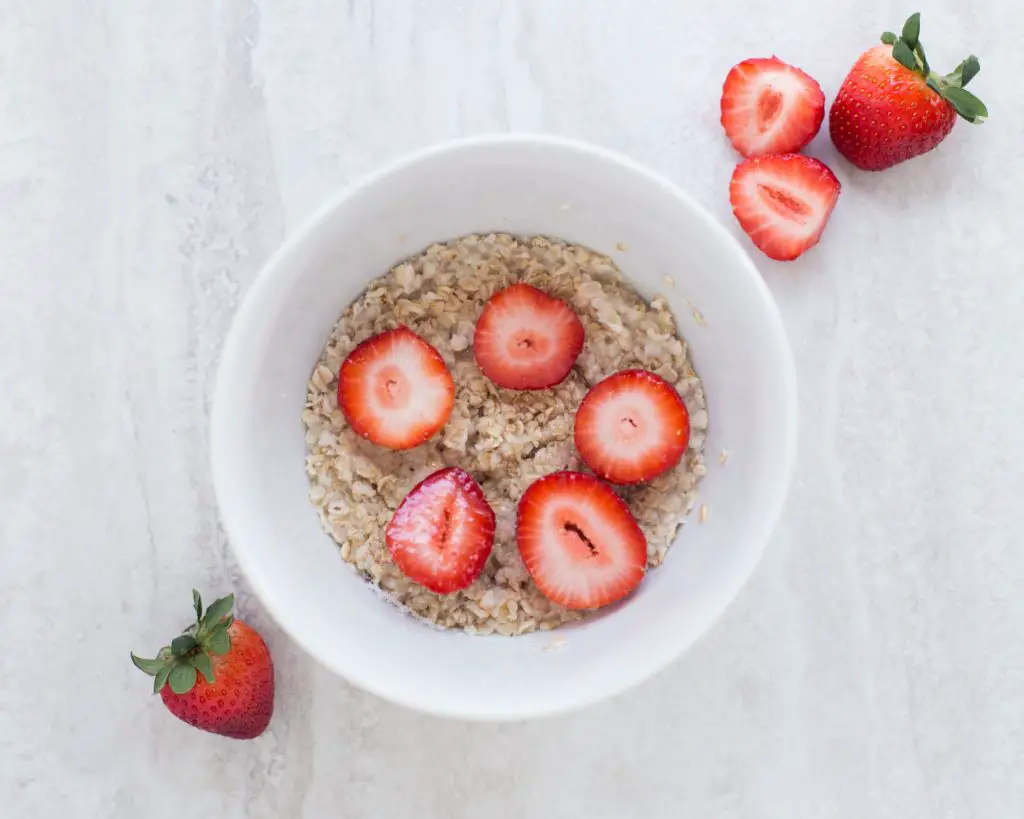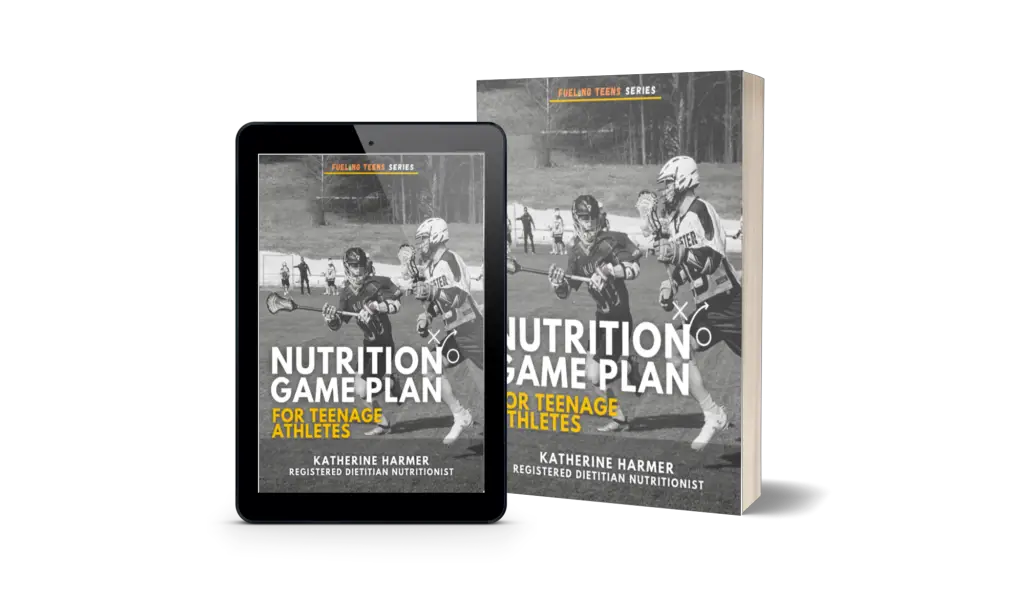Carbs are not the enemy. Low-carb diets are popular, and many dieters do not fully understand why they are limiting carbs besides the fact that carbs are “bad”, right? Carbs are not bad, your body needs lots of carbs each day, but there are healthy carbohydrates and unhealthy carbohydrates. Lentils and jelly beans are both carbs. What type should you really be limiting?
A 15 year-old needs between 2,000 to 3,000 calories per day depending on age, gender, size, physical activity level, etc. Daily carbohydrate recommendations are 45-65% of total calories. That means 15-year olds need 225-325 grams (for 2,000 calories) to 338-488 grams (for 3,000 calories) of carbohydrates per day to support growth, energy needs, brain function, muscle movement, energy storage, etc.
Teenagers especially need the right amount of healthy carbohydrates for their growing bodies and developing brains. See chart below for specific recommendations based on calorie level.
Keep reading for specific carbohydrate recommendations from a registered dietitian nutritionist for your teen including why carbs are not bad, what are the best carbs, what foods actually contain carbs, and when the best time to eat carbs is for your body.

How Many Carbs Should a Teenager Eat in a Day?
First check out my post to see how many calories your teen needs in my calorie recommendation chart. Most 15 year-old moderately active females need about 2,000 calories per day and a 15 year-old moderately active males need about 2,400 to 2,600 calories per day.
Here are some more recommendations for different ages of teens: A 13-18 year old moderately active female needs about 2,000 calories, and a 19 year-old moderately active female needs about 2,200 calories per day.
A 13-15 year-old moderately active male needs between 2,200-2,600 calories per day. A 16-19 year-old moderately active male needs about 2,800 calories per day.
Now that you know your teen’s calorie level, check out their recommended amount of carbohydrates per day here:
Daily Recommended Carbohydrate Levels for Your Teen Based on Calorie Needs:
| Calorie Level | Recommended Carbohydrate Amount |
|---|---|
| 1,600 calories | 180-260 grams |
| 1,800 calories | 203-293 grams |
| 2,000 calories | 225-325 grams |
| 2,200 calories | 248-358 grams |
| 2,400 calories | 270-390 grams |
| 2,600 calories | 293-423 grams |
| 2,800 calories | 315-455 grams |
| 3,000 calories | 338-488 grams |
The optimal carbohydrate intake depends on the individual and several factors such as age, gender, size, overall health, and physical activity level, as well as food culture and personal preference.
There should be no reason for teenagers to limit carbohydrates as long as they are in good health and try to stick to whole, nutritious, complex carbohydrates. Teenagers with health problems might need to limit carbohydrates or certain types of carbohydrates. Consult your doctor and a registered dietitian nutritionist for specific recommendations.
How Many Carbs Should You Eat Per Meal?
Sample Meal plan For Carbohydrates:
The average teenager needs somewhere around 300 carbohydrates per day, more or less depending on calorie level, size, physical activity amount, etc. Here’s how to break that up during the day:
Breakfast– 90 grams carbohydrates
Snack– 15-45 grams carbohydrates
Lunch– 75 grams carbohydrates
Snack– 15-45 grams carbohydrates
Dinner– 75 grams carbohydrates
Snack– 15-45 grams carbohydrates
Carbohydrate Meal Plan for Teenage Athletes:
Teenage athletes might even need more carbohydrates than others to fuel their bodies for activity. They may function better with a high amount of carbohydrates from foods, more on the higher end of the recommendations with 55-65% calories coming from carbohydrates.
Teen athletes likely need about 6 to 10 grams of carbohydrate per kilogram of body weight per day (depending on exercise intensity and overall calorie needs). For a 150-pound (68 kg) athlete that would equal 410 grams to 681 grams of carbohydrates per day. Here’s what that could look like:
Breakfast- 105 grams carbohydrate
Lunch– 90 grams carbohydrate
Pre-Workout Snack (1 hour before)- 60-120 grams carbohydrate
During intense exercise (if needed, if more than 45 minutes)- About 50 grams per hour. Choose sports drinks, fruit, etc.
Post-Workout Snack (if needed within 30 minutes)- 0.6 to 0.8 grams carbohydrate per kilogram body weight. That’s about 40 to 54 grams for a 150-pound (68 kg) athlete.
Dinner– 90 grams carbohydrate
Common Servings of Carbohydrates:
Officially, serving sizes of carbohydrate foods are the amount of food that contains 15 grams of carbs. Fiber is a type of carbohydrate that our body handles differently and isn’t digested, so many people who count carbohydrates don’t always count fiber as carbs. Here are common carbohydrate foods, their serving sizes, and how many carbs they contain.
- Dairy
- 1 cup lowfat milk= 12 grams
- 2/3 cup plain lowfat yogurt= 12 grams
- 1 cup cottage cheese= 6 grams
- Fruits
- 1 medium apple= 30 grams
- 1 medium banana= 40 grams
- 1 cup grapes= 58 grams
- 1 1/4 cup strawberries= 15 grams
- 1 1/4 cups cubed watermelon= 15 grams
- 1/2 cup raisins= 62 grams
- 1 cup 100% orange juice= 30 grams
- Vegetables
- 1 cup bell peppers= 5 grams
- 1 cup broccoli= 5 grams
- 1/2 cup green peas= 15 grams
- 1/2 cup corn= 15 grams
- 1 cup squash= 15 grams
- Grains
- 1 cup cooked oatmeal= 30 grams
- 2 slices of 1 oz bread= 30 grams
- 1/3 cup cooked brown rice= 15 grams
- 1/3 cup cooked white rice= 15 grams
- Beans, Peas, Lentils, Legumes
- 1/2 cup cooked kidney beans= 15 grams
- 1/2 cup cooked lentils= 15 grams
- Nuts and Seeds
- 1 Tablespoon chia seeds= 10 grams (comes from fiber)
- 1/4 cup walnuts= 3 grams (some from fiber)
- 1/4 cup almonds= 3 grams (half from fiber)
- Refined and Sugary Carbohydrates
- 1 cup sugary breakfast cereal= 30 grams
- 1 can (12 oz) soda= 38 grams
- 1 medium cookie= 22 grams

See also: Meal Plan for Teenage Athletes
What are Carbohydrates? Why Are They Good For You? And Why Do You Need Carbs?
Carbohydrates are sugars, starches, and fiber from plants like fruits, vegetables, grains, some legumes, and also from dairy products. Not all carbohydrates are created equal. Carbohydrates are found in plenty of unhealthy foods, which gives them a bad rap, but they are found in plenty of healthy foods as well.
You get carbohydrates from bread, milk, potatoes, beans, breads, cookies, pasta, corn, soda, apples, bananas, lentils, etc.
Carbohydrates are a key form of energy that we use to fuel almost every type of cell in our bodies. They are an important source for fuel for our bodies. Kids and teens (and adults) need carbohydrates to help them have the energy they need each day to walk, run, think, breathe, talk, digest food, exercise, etc.
Carbohydrates are digested and turned to glucose in your body which enters your blood stream and provides energy to your body tissues. Too many refined, sugary carbohydrates can spike your blood sugar too quickly for fast energy, but later on causes a “crash” in your blood sugar that causes feelings of fatigue, irritability, cravings, etc.
If you eat too many carbohydrates, some glucose can be stored in your muscles and liver for later use, but it can also be turned into fat for stored energy.
Carbohydrate intake is quite controversial today. Some individuals claim that carbohydrates can cause weight gain, obesity, type 2 diabetes, etc. and they should mostly be avoided. Others still recommend about half of your calorie intake come from carbohydrates. There is good research on both sides of the argument.
Carbohydrate requirements seem to be very individualized, some people do better on low-carb diets than others, and some individuals do better eating lots of carbohydrates. Low-carb diets can have important health benefits for many people, but are not the answer for everyone.
What are ‘Bad’ Carbs?
I don’t typically label any food as “bad”, there are just foods that are “less good” for you than others. Certain types of carbohydrates provide little nutrients and less than desirable energy sources for your body. These include:
Refined grains such as white flour, white bread, pasta, crackers, tortillas, sugary breakfast cereals, white rice, etc.
Sugary foods such as candy, desserts, baked goods, ice cream, snacks, sweets, soda, juices, added sugars in foods, etc.
These are the types of carbohydrates that you want to limit in your diet. These foods still provide carbohydrate energy for your body, but provide little other nutritional value. Research has shown that health problems like obesity and type 2 diabetes typically are associated with a high intake of refined carbohydrates.
Too many refined carbohydrates cause large spikes in blood sugar which leads to a crash later than causes cravings, hunger, and other negative effects that often lead to increased refined carbohydrate intake.
A small amount of these foods in moderation may be fine for most people, but it’s typically best to avoid them. Choosing carbohydrates from better sources that also provide fiber and other vitamins and minerals will help you have a balanced, healthy diet.
What are ‘Good’ Carbs?
The best carbs for your diet are healthy carbohydrates that come from whole, unrefined foods such as vegetables, fruit, legumes, potatoes, and whole grains. Carbohydrates are also naturally-occurring in dairy products. These are good choices for carbohydrate recommendations because they contain important energy, fiber, and vitamins and minerals.
Research shows that a high intake of the good, fiber-containing carbohydrates leads to improved health and a lower risk of disease.
What Are the Healthiest Carbohydrates to Eat?
- Vegetables: squash, bell peppers, broccoli, etc.
- Fruits: berries, bananas, apples, oranges, pears, etc.
- Legumes: lentils, beans, peas, etc.
- Tubers: potatoes, sweet potatoes
- Whole Grains: oats, quinoa, brown rice, etc.
- Nuts and Seeds: almonds, walnuts, chia seeds, pumpkin seeds
- Dairy: milk, yogurt, cottage cheese

Why Does a Teenager Need Carbohydrates?
Carbs are an important part of a teenager’s diet. Carbohydrates provide energy which teenagers need in large amounts during growth, puberty, development, and to focus in school and sports.
Carbohydrates help fuel a teenager’s muscles and brain for daily activities such as walking, talking, homework, focusing in school, chores, breathing, eating, physical activity, and many other daily activities.
Many teenagers enjoy the highly-processed, less healthy carbohydrate snacks, desserts, and sugary drinks. Too many of these types of carbohydrates can cause undesirable side effects as blood sugar changes too rapidly, such as inability to concentrate, lack of energy, cravings, fatigue, etc. as well as weight gain.
Teens needs carbs for energy, but should limit refined carbohydrates. Teens should choose their carbohydrate sources from whole, natural foods that are full of nutrients such as whole grains, fruits and vegetables, beans, whole grains.
What Happens When You Don’t Eat Enough Carbs?
Carbohydrates are the #1 fuel-choice for your body to fuel your muscles and brain. Some people do well on a low-carb diet as our bodies can use alternative pathways to convert energy, but I wouldn’t recommend low-carb diets to most growing and developing teenagers.
At first, not eating enough carbs causes your blood sugar levels to drop below normal, which is called hypoglycemia. Hypoglycemia causes hunger, shakiness, confusion, dizziness, fatigue, inability to concentrate, etc.
Without enough carbohydrates, your body also has to start burning fat for energy, and leads to ketosis, which isn’t the same efficiency to get energy. Ketosis causes mental fatigue, lethargy, dry mouth, bad breath (think if you’ve ever gone a long time without eating such as overnight and then skipped breakfast and lunch), nausea, headaches, etc.
Too low of carbohydrates can make it really hard for teenagers to function and focus during the day at school, work, sports practice, etc. These symptoms will improve slowly after eating carbohydrates.
Low carb diets (less than 40% of calories coming from carbohydrates) can majorly impact how your body functions. can cause energy drain, weakness, fatigue, muscle cramps, constipation or diarrhea, more exertion for exercise, some bloating, impaired concentration, inability to focus, weight gain, food cravings, bad breath, irregular digestion, difficulty sleeping, not feeling satisfied after meals, etc.
You’ll also be likely lacking important nutrients that come from healthy carbohydrates such as fiber and many vitamins and minerals.
Anything less than 100 grams per day is really low, and not sustainable long term for many individuals.
Low-carb diets can be beneficial for some individuals (especially those with related health concerns), but it isn’t typically the best idea to restrict healthy foods just because they contain carbohydrates such as fruits, vegetables, whole grains, etc. You can get many important nutrients and benefits from these foods.
Avoiding carbs is not a good idea for teenagers. You’d do a lot better cutting out carbs from soda and cake than from cutting out all carbs from your diet.
A low-carb diet is considered a fad diet, many people try to follow it without fully understanding the reasoning or benefits and consequences. Teenagers who engage in any type of restrictive dieting can easily develop a poor relationship with food, negative body image, and disordered eating habits from having strict “food rules”.
The teenage years are the best time for a teen to learn about their body, develop healthy eating habits, learn simple food preparation skills and techniques, and learn what lifestyle changes could be negatively affecting their weight.
Your brain especially needs carbs every day to function and help you focus, learn, think, process information, etc. Your muscles can use alternative pathways to get the fuel that they need even if you aren’t eating enough carbohydrates, but it’s very important for your brain to get enough carbohydrates each day.
You may have heard that you need at least 130 grams of carbohydrates per day to fuel your brain and other important body functions. Your body can convert other energy sources from fats, but it’s not as efficient and some people don’t do as well on a high-fat, high-protein, low-carbohydrate diet. I still recommend a modest amount of carbohydrates per day for teenagers, around 130-150 at a minimum.
Most teens need around 300 or more carbohydrates per day and it can be pretty easy to fit carbohydrates sources into the diet, so many teens are likely meeting requirements without even trying. The problem is that teens need to make their carbohydrate food choices come from healthy carbohydrates that are full of nutrients like whole grains, fruit, and veggies instead of sugary carbohydrates like white bread, lollipops, soda, etc.
How Many Carbs Should I Eat Per Day To Lose Weight?
Carbs are not the cause of obesity, but eating a lower-carb diet can help with weight loss. Most teenagers should not eat less than 40% of their calories from carbohydrates. For a 2,000 calorie diet that equals no less than 200 grams of carbohydrates per day. For a 3,000 calorie diet that equals no less than 300 grams of carbohydrates per day.
If teenagers need to lose weight, the best way is not necessarily to focus on eating less carbs, but instead eating less refined and sugary carbs like white breads and desserts. Healthy carbohydrates from whole grains, fruits, vegetables, legumes, and dairy products provide needed energy and lots of important and essential nutrients for teenagers to grow, develop healthily, and function.
A low-carbohydrate diet is not usually recommended for teenagers, but by limiting carbs from unhealthy carbohydrates per day you’ll be filling up on more protein and fat, which can be more filling and satisfying so you won’t feel as hungry between meals.
How Many Carbs Should a Teenage Girl Eat Per Day to Lose Weight?
A teen girl can still healthily eat the recommended 45-65% of calories from carbohydrates, that’s between 225-325 grams of carbohydrates per day on a 2,000 calorie diet. The important part of making sure teen girls are at a healthy weight is more about eating smarter, not necessarily just eating less.
The more important question should be, “WHERE are a teenager’s carbohydrates coming from?” The goal is to be focusing on those healthy, complex carbohydrates from natural, whole foods, and not on refined snack and fast foods. Save the treats and desserts for special occasions, not for snack foods every day.
Even though “junk” foods, fast foods, and processed foods are popular among teenagers, teens can still learn healthy eating habits and learn to fuel their bodies properly and stay away from the vending machine at school. It takes practice and planning, but with a little help from parents, teenagers can develop healthy habits that will benefit them long term.
It starts with a parent’s example. What type of food is stocked in the pantry and fridge at home? What type of meals are prepared or served at home? Are healthy snacks available for teenagers to quickly grab for school or after-school snacks? Does your teenager help with meal prep?
If the answer is no to any of these questions, some simple changes at home can help a teen develop a healthy relationship with foods that will nourish and energize them the right way.
What Happens When You Stop Eating Carbs?
It’s pretty hard to eat “zero” carbs per day since carbohydrates are in many, many different types of foods in small amounts. You would have to eliminate many healthy foods such as whole grains, fruits, vegetables.
It would be unwise and unhealthy to limit all carbs. If you eat very low carbs and cut out all sugary foods, fruits, starchy vegetables, whole grains, dairy products, and all other carb-containing foods, your body would have to rely on alternative pathways to turn fat and protein into fuel for the brain and muscles.
It’s similar to what happens when your body is fasting or in “starvation mode”, except muscle mass is preserved. Your body goes into ketosis where not enough glucose is available for energy, so fat is broken down to ketones to provide most of the fuel for your body.
Once your body is in ketosis you might experience flu-like symptoms and other unpleasant side effects such as mental fatigue, brain fog, lethargy, dry mouth, bad breath, nausea, headaches, difficulty sleeping, cramps, cravings, irritability, stomachaches, etc. The initial adjustment to transition to an ultra-low carbohydrate diet can be rough because the symptoms are not very pleasant, but you should feel better over time.
Longterm, the keto diet can create risk for constipation as it can be difficult to get enough fiber. More health risks include kidney stones, liver disease, and vitamin and mineral deficiencies such as vitamin A, vitamin C, vitamin K, and folate. Some research also suggests that the high fat keto diet can increase risks for heart disease and other health problems.
The low-carb ketogenic diet, or keto, is popular because being in ketosis is a popular weight loss strategy as it can help you feel less hungry. Side note- interesting fact, the keto diet was first used for children with epilepsy as ketosis seemed to help prevent seizures. The keto diet today is extremely popular for weight loss.
With an extremely well-planned diet, keto diets can be healthy, balanced, and safe, but this takes a lot of work and practice and isn’t necessarily recommended for most teenagers who are still learning about their bodies and about healthy food choices. Restrictive diets will not likely be beneficial at this point.
Health is not a one-size-fits-all-prescription. Some people do well on low-carbohydrate diets, and some people do better with a higher amount of carbohydrates. Every individual is different and it’s important to listen to our bodies and understand how we feel when we are eating certain ways.
What is Considered a Low Amount of Carbs?
Anything less than 40% of total calories from carbohydrates is considered low-carb (about 200 grams of carbs on a 2,000 calorie diet). Anything less than 50 grams per day of carbohydrates is ultra-low carbohydrates. The keto diet limits carbohydrates to 50 grams per day and can be difficult for many people to follow without making extreme changes to their eating habits.
What Foods Have No Carbs?
Many foods contain carbohydrates in large or small amounts, so it can be difficult to understand which foods do not contain carbohydrates. Non-carbohydrate containing foods include (or foods with zero net carbs):
- Meat and many animal products such as poultry, beef, pork, fish, eggs, butter, and most cheese
- Most seasonings and spices
- Beverages such as coffee, tea,
- Oils
- Some nuts, seeds, non starchy vegetables, avocados, and coconuts contain little carbs
Summary:
Overall, carbohydrates are healthy choices for teenagers, even for teenagers striving to get to a healthy weight. The latest research has shown that a moderate amount of carbohydrates is the healthiest diet for most individuals.
Diets of too low and too high carbohydrate intakes were linked with more health risks and problems. Like most things in nutrition, balance and moderation is key!
Teen athletes especially should be cautious before following restrictive diets such as low-carb or keto. Many athletes don’t do well on low-carbohydrate diets. It has to be extremely carefully planned. Athletes thrive on healthy carbohydrates to fuel competition.
Related Questions:
Who Should Be On a Low-Carb Diet? Many individuals with health needs such as Type 2 diabetes should follow a lower-carb diet. Low-carb/keto diets may also help as a treatment for epilepsy. Those who should not be on a low-carb diet include many athletes, those with pancreatic disease, liver disease, thyroid problems, history of eating disorders, or gall bladder problems.
See Also:
- Is Intermittent Fasting Safe for Teenagers?
- What is the Best Diet Plan for a 15 Year-Old to Lose Weight?
- Should a Teenager Count Calories?
- How Many Snacks Should a Teenager Eat Per Day?
- How Much Sugar Can a 14-Year Old Have Per Day?
Need more help with your diet this season? Get help from a registered dietitian nutritionist, check out my newest eBook: Nutrition Game Plan for Teenage Athletes. Includes 28-day meal plan, snack list, meal schedule, supplement tips, and so much more for your best season yet!
Also Available From Fueling Teens:
- FREE Downloadable Meal Plan for Teen Soccer (Football) Players
- Nutrition Game Plan for Teenage Basketball Players
- Nutrition Game Plan for Teenage Football Players
References:
The Academy of Nutrition and Dietetics. What is the Ketogenic Diet? Written by Barbara Gordon, RDN, LD. Published May 15, 2019. https://www.eatright.org/health/weight-loss/fad-diets/what-is-the-ketogenic-diet
The Academy of Nutrition and Dietetics. Children Need Carbohydrates. By Vicki Shanta Retelny, RDN, LDN. Published November 27, 2018. https://www.eatright.org/food/nutrition/dietary-guidelines-and-myplate/children-need-carbohydrates
https://www.thelancet.com/journals/lanpub/article/PIIS2468-2667(18)30135-X/fulltext
Written by Katherine Harmer, RDN
Fueling Teens is a participant in the Amazon Services LLC Associates Program, an affiliate advertising program designed to provide a means for sites to earn advertising fees by advertising and linking to Amazon.com. We also participate in other affiliate programs which compensate us for referring traffic.

